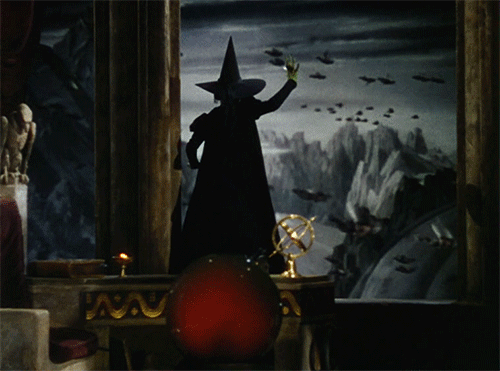Sir Winston Churchill said: "History will be kind to me for I intend to write it."
But L. Frank Baum's classic "history" of the Land of Oz was most unkind to the Wicked Witch of the West and her sister; it showed Dorothy Gale as an innocent gently tricked by the Wizard and Glinda the Good. But what if this is a biased story? Isn't it fair to give the Witch a chance to set us straight?
Gregory Maguire's novel, Wicked, does just that. According to Maguire, the Witch who tormented Dorothy and her friends was once an infant, born with a green skin and vicious teeth, and a violent allergy to water. Elphaba yearns all her life for the approval of her father, but it is given instead to her armless sister, Nessarose. She is Glinda's roommate at a nearly-Hogwartian academy, where she is the butt of jokes perpetrated by the "good" Glinda and her noble friends. Her one friend, Doctor Dillamond, is a Goat trying valiantly to find a scientific basis to fight the Wizard's denial of Animal Rights.
Shortly after Doctor Dillamond is murdered, the three girls—Glinda, Elphaba and Nessarose—are recruited by the politically-connected Headmistress, Madame Morrible, to become sorceress-ministers for the North (Glikkus), South (Quadling Country) and East (Munchkinland) quadrants of Oz. The west (Vinkus or "Winkie" Country) is considered too rural to be a threat to the empire-building Wizard. Elphaba escapes this geas (perhaps), hiding in the Emerald City, abetting the terrorist rebel forces, engaging in a long love affair with Fiyero, Prince of the Vinkus.
Fiyero is murdered by the Gale Force (the Imperial Storm Troopers of the Wizard), and Elphaba eventually makes her way to the Vinkus with a young boy who may be his son. As the muledriver observes on this trip, To the grim poor, there need be no pour quois tale about where evil arises; it just arises; it always is. One never learns how the witch became wicked, or whether that was the right choice for her—is it ever the right choice?
Part of the fun of the novel is recognizing elements from the Baum series or from the 1939 movie. A misdirected Life Powder animates a mounted rack of antlers on the wall—and foreshadows the wonderful Gump from the second book of the series. Madame Morrible's murdering manservant Grommetik is Tik-Toc of Oz. Young Elphaba is disgusted by an experiment on a Lion cub too young to have been removed from its mother—when she frees the Animal, we know this cub will grow into the Cowardly Lion. When Elphaba rescues a snow monkey, we see the origin of the flying Monkey squadrons that will eventually carry off Dorothy, Toto and the Lion.
But much of the story is darker than Baum's tale ever wanted to be. Glinda's award of the silver slippers to Dorothy is a coldly-calculated propaganda move designed to help the Wizard crush the Munchkinland rebellion. The Emperor Wizard's emblem, a balloon and basket with crossed bars beneath it, looks like a skull and crossbones at first glance. The Wizard himself is revealed as a tyrannical Satanist who hints at having performed human sacrifice to get to Oz from the Other Land in order to retrieve an earthly Grimmoire. (And who he sacrificed is one of the surprises at the end of the book.)
Elphaba castigates herself as a failure, seeking redemption from her sins even while she vehemently denies that redemption is possible. The evil of this Witch, it seems in the end, is in squandering her love on the inanimate and unconscious, while ignoring or rejecting the people that surround her. Her final baptism (remember, we know how this story ends) releases her at last from her unhappy life.
This is no child's tale. Read it, and I guarantee you'll never see the Wizard of Oz in quite the same way again.

No comments:
Post a Comment